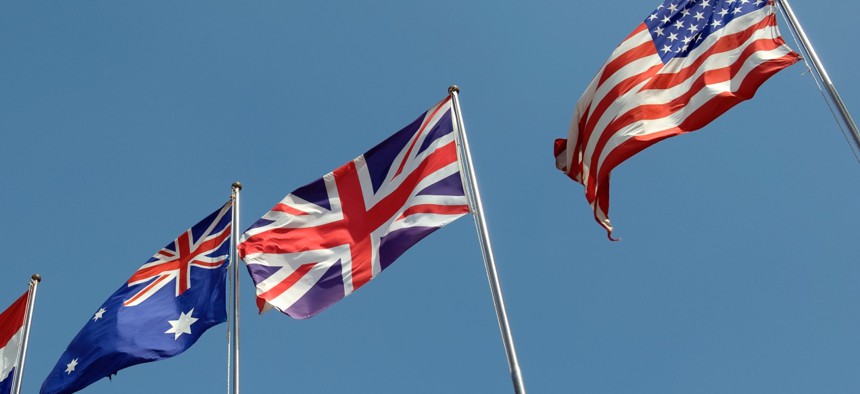AUKUS partnership success hinges on export controls for sensitive tech, officials say

State and Defense department officials testified before the Senate Foreign Relations Committee Wednesday about developing export controls that would allow Australia, the U.K. and U.S. to collaborate on emerging technology development. kevinjeon00 / Getty Images
The trilateral Australia-U.K.-U.S. partnership is intended to share more emerging technologies, which officials say demands synchronicity in export control standards.
The future direction of the U.S.’s strategic geopolitical partnerships with Australia and the United Kingdom will focus heavily on modernizing existing security programs and applying emerging technologies to ongoing information sharing.
Government officials working in federal diplomatic policy testified before a Senate Foreign Relations Committee hearing on Wednesday, the common denominator of which emphasized leveraging the Australia-U.K.-U.S. — or AUKUS — partnership to further advance emerging technology systems, namely artificial intelligence, quantum sciences and hypersonic technology.
“Securing our critical technologies is a three-way street, and we have already begun these engagements to move AUKUS forward,” said Jessica Lewis, assistant secretary at the Department of State’s Bureau of Political Military Affairs. “We are partnering with Australia and the U.K. to jointly develop advanced military capabilities based on the most cutting edge emerging technologies our nation possesses.”
Despite the prevalence of AI and quantum information science developments in the news, Lewis highlighted the recent experiments within the AUKUS partnership on hypersonic unmanned aerial systems. She and fellow witness Mara Karlin, the assistant secretary of defense for Strategy, Plans and Capabilities at DOD, highlighted the alliance’s efforts to supply Australia with nuclear-powered submarines.
Karlin noted, however, that back in April, AUKUS researchers tested the joint deployment of AI-enabled assets to detect and track military targets.
Both Lewis and Karlin also discussed the legislative imperatives needed for this continued level of technological collaboration, specifically regarding export controls. Lewis said she broadly supports streamlining export controls so AUKUS countries can easily and safely share intellectual property for mutual benefit.
“We are confident that Australia and the U.K. and the United States will end up with comparable standards,” Lewis said regarding the alignment of export control regimes. “The reason we need those standards is to make sure that adversaries or others who are trying to gain control [and] access to our IP, to our most sensitive technologies, cannot do so.”
Legislation already passed by the Senate as part of the fiscal 2024 National Defense Authorization Act offers allies within AUKUS a route to export defense technologies and systems to each other without the bureaucratic backlog related to licensing.
“It's common sense to work together to bring all of us to similar standards. And I would say it's not just to protect our companies and the IP that they produce, but fundamentally it's to protect our warfighter,” she said. “Because if these technologies are exploited and used against our warfighter, we're also putting them in danger and we take that responsibility very seriously.”
Referring to this as a “groundbreaking approach” to national security, trade and collaboration, Lewis said that it will offer confidence to AUKUS allies and participating contractors that defense tech IP will be protected and used appropriately in its international journey.
“Companies and the countries need surety about how these defense articles are going to move, and we need confidence that they're going to move speedily and safely,” she said.
NEXT STORY: Inside Spain’s burgeoning quantum tech landscape






